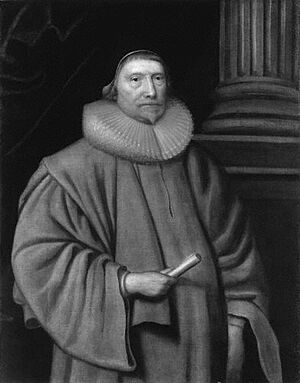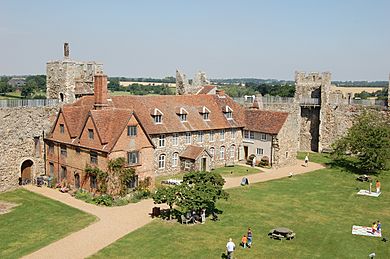Robert Hitcham facts for kids

Sir Robert Hitcham (born around 1572 – died 1636) was an important English lawyer and politician. He served as a Member of Parliament (a person elected to help make laws) and later became the Attorney General, a top legal advisor, for King James I.
Contents
Becoming a Lawyer and Politician
Early Life and Education
Robert Hitcham was born in Levington, a small village near Ipswich. He didn't come from a rich or famous family. He went to the Free School in Ipswich, which was a school open to many children. Later, he studied law at Pembroke College, Cambridge, a famous university.
In 1589, he joined Gray's Inn, which is one of the places where lawyers are trained in London. By 1595, he had finished his training and was "called to the Bar." This meant he was officially allowed to work as a lawyer.
Serving in Parliament
Sir Robert Hitcham became a Member of Parliament several times. This meant he was chosen by people to represent them and help make decisions for the country. He represented different towns:
- West Looe, Cornwall (1597–1598)
- King's Lynn, Norfolk (1604–1611)
- Cambridge (1614)
- Orford, Suffolk (1624–1626)
He also held several important legal jobs. He was the Attorney-General for Queen Anne of Denmark, who was King James I's wife. He also became a "Sergeant-at-law," which was a very senior type of lawyer. In 1604, King James I made him a knight, so he became "Sir Robert Hitcham."
Later Years and Legacy
Framlingham Castle and His Death

In 1635, Sir Robert Hitcham bought Framlingham Castle in Suffolk for a large sum of money, £14,000.
He passed away on August 15, 1636. His tomb, where he was buried, can be found in the Church of St Michael the Archangel, Framlingham.
Helping Others After His Death
Sir Robert Hitcham left very specific instructions in his will (his last wishes). He wanted the inside buildings of Framlingham Castle to be taken down. The stones from the castle were then used to build a "poor house." This was a place called Sir Robert Hitcham's Almshouses, which provided homes for people who were poor or elderly and needed help.
He also cared a lot about education. He left money to start a school for local children in Framlingham. This school, which originally taught only boys, is now the Framlingham Sir Robert Hitcham Primary School. He also provided money to fund schools in Debenham and Coggeshall. The school in Debenham is still named after him: Sir Robert Hitcham CEVA Primary School.
Sir Robert Hitcham also gave the land where Framlingham Castle stood to Pembroke College, Cambridge, his old university. Some of this land was later used to build Framlingham College, another school created to honor Prince Albert.
Today, a part of Pembroke College, called Hitcham's Cloister (built in 1666), is named after him. Also, one of the houses at Thomas Mills High School in Framlingham is called Hitcham House, keeping his memory alive.
 | Anna J. Cooper |
 | Mary McLeod Bethune |
 | Lillie Mae Bradford |

